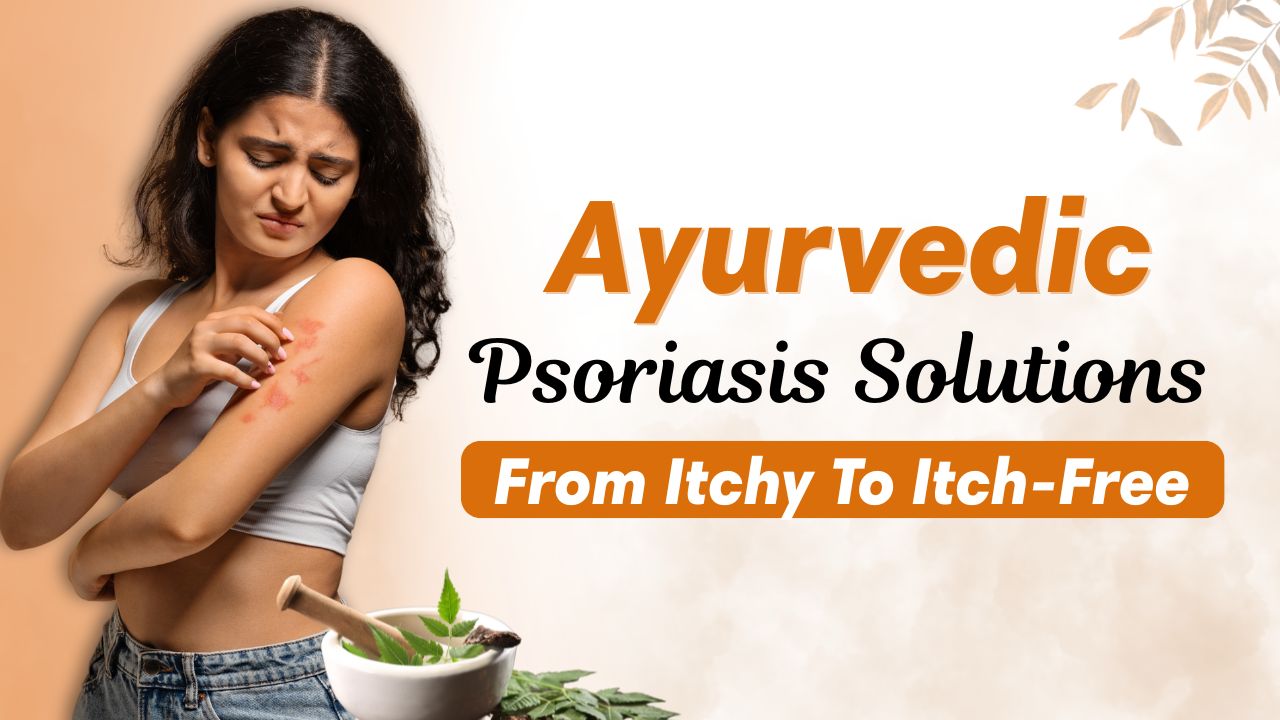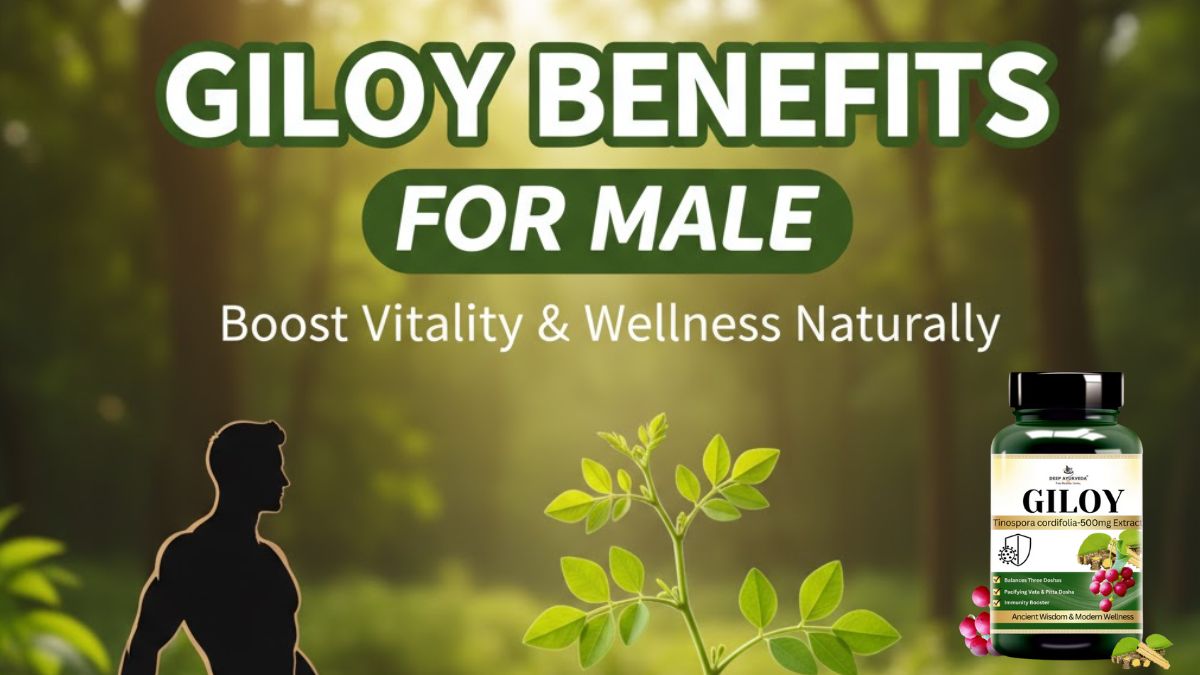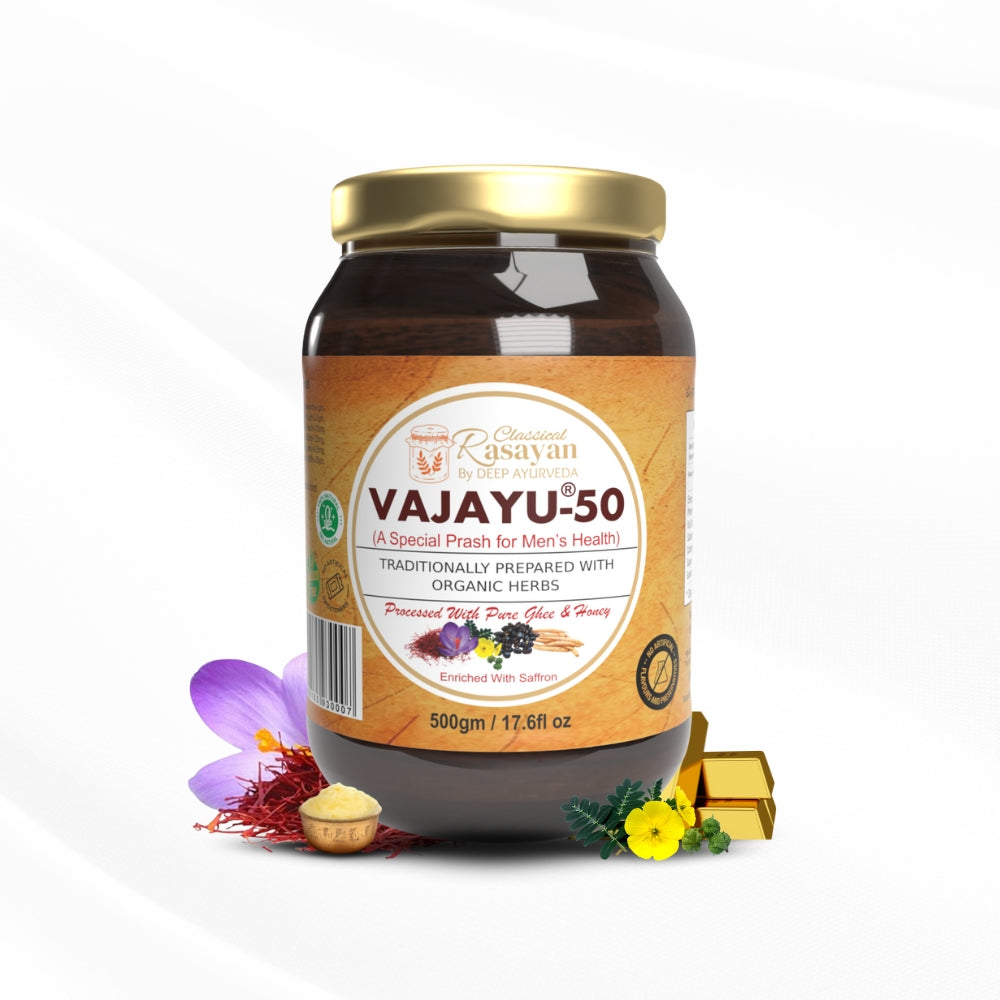Introduction
Psoriasis is a chronic, immune-mediated, inflammatory dermatosis that predominantly affects the skin, scalp, and nails, often presenting as erythematous, scaly plaques with variable pruritus. From a contemporary biomedical perspective, psoriasis is considered an autoimmune disorder characterized by dysregulated T-cell activity, leading to abnormal keratinocyte proliferation and systemic inflammation. However, from the Ayurvedic paradigm, psoriasis is profoundly understood through the lens of Kushtha Roga, particularly Ekakushtha—a classical dermatological entity delineated in the Charaka Samhita, Sushruta Samhita, and other authoritative treatises.
Deep Ayurveda, a premier institution of integrative Ayurvedic care based in Mohali, and serving the entire Tricity region (Panchkula, Chandigarh), offers authentic, root-cause–oriented Ayurvedic management for Psoriasis. Employing classical Panchakarma procedures, proprietary herbal formulations, and patient-specific dietary regimens, Deep Ayurveda remains at the forefront of personalized and sustainable skin healthcare.
Ayurvedic Classification of Psoriasis: Correlation with Ekakushtha
Ayurveda does not label diseases merely through symptomatic categories, but evaluates them via dosha-dushya sammurchana (interaction between bioenergies and tissues). Psoriasis bears clinical resemblance to Ekakushtha, a type of Kshudra Kushtha, which is characterized by distinct scaliness, roughness, dryness, and extensive plaque formation.
"अस्वेदनं महावस्तु परुषं मत्स्यशकलोपमम्।
एककुष्ठं विबोध्येत वातकफसमुद्भवम्॥"
— Charaka Samhita, Chikitsa Sthana 7/21
Translation: Ekakushtha is marked by absence of perspiration, large skin lesions, roughness, and scaling akin to fish skin—arising from vitiated Vata and Kapha doshas.
This pathogenesis mirrors the desquamation, plaque formation, and non-infectious inflammatory profile observed in psoriasis, thus establishing a robust clinical correlation.
Modern Pathophysiology of Psoriasis
Modern medicine regards psoriasis as a chronic systemic inflammatory condition, primarily involving hyperactive Th1 and Th17 cells, which secrete cytokines such as IL-17, IL-23, TNF-α, and IFN-γ. These mediators promote keratinocyte hyperproliferation, angiogenesis, and lymphocytic infiltration into the dermis and epidermis.
Contributing factors include:
-
Genetic predisposition (e.g., HLA-Cw6)
-
Environmental triggers: infections, trauma (Koebner phenomenon), stress
-
Lifestyle factors: smoking, alcohol, poor diet
-
Metabolic syndrome: obesity, dyslipidemia, insulin resistance
Unlike modern therapeutics which predominantly focus on symptom control via immunosuppressants and biologics, Ayurveda offers a holistic model aimed at restoring immune homeostasis and metabolic balance.
Nidana (Causative Factors) in Ayurveda
In the Ayurvedic doctrine, Kushtha arises from a wide array of Nidanas that vitiate the doshas and dhatus, compromise Agni (digestive fire), and accumulate Ama (metabolic toxins). Psoriasis-specific nidanas include:
"दधिमत्स्यकषीराणि नवनीतं सुरासवम्।
स्नेहमत्यर्थगौरवं गुरु-अम्ल-लवणप्रियम्॥
अजीर्णं चाभ्यसञ्च चैवात्युष्णं रूक्षमेव च।
शीतम्भुपानं व्यायामं स याति कुष्ठतां नरः॥"
— Ashtanga Hridaya, Nidana Sthana 14/3–4
Key Triggers:
-
Viruddha Ahara (incompatible food combinations, e.g., fish + milk)
-
Excessive intake of heavy, fermented, and unctuous foods
-
Irregular eating habits leading to Mandagni (digestive impairment)
-
Suppression of natural urges (Vegavidharana)
-
Excessive physical exertion followed by cold exposure
-
Prolonged mental stress, anxiety, unresolved emotions
These factors initiate tridoshic vitiation, primarily Vata and Kapha, along with Rakta Dhatu involvement, producing clinical features analogous to modern psoriasis.
Samprapti (Pathogenesis) According to Ayurveda
"दोषाः समुत्थिता देहे त्वचि रक्ते च सन्निविश्य।
कुर्वन्ति कुष्ठं समुत्थानं स्रोतसां संक्षयन्ति च॥"
— Sushruta Samhita, Nidana Sthana 5/4
The pathological sequence begins with dosha vitiation, particularly Vata and Kapha, infiltrating Twak (skin), Rakta (blood), and Mamsa (muscle tissues). This leads to Srotorodha (blockage of microchannels) and subsequent manifestation of thickened, discoloured plaques. The persistent presence of Ama exacerbates inflammation and delays tissue regeneration.
Lakshana (Clinical Features) of Psoriasis
Ayurvedic texts describe the hallmark signs of Ekakushtha, many of which parallel modern clinical observations:
-
Aswedanam: Lack of sweating over lesions
-
Mahavastu: Broad patches
-
Parusha: Rough, dry texture
-
Matsyashakalopama: Silvery scales resembling fish skin
-
Rukshata and Kandu: Dryness with itching
-
Tvak sphutana: Cracking of skin
-
Dirghakalanubandhi: Chronic and recurring in nature
In severe forms, nail pitting, joint pain (psoriatic arthritis), and psychological distress may also occur.
Chikitsa Sutra (Treatment Principle) of Psoriasis in Ayurveda
"सर्वेषां कुष्ठरोगाणां शोधनं प्रधानं स्मृतम्।
शमनं चापि युक्तेन भेषजेन प्रशस्यते॥"
— Charaka Samhita, Chikitsa Sthana 7/40
Treatment of psoriasis is multi-pronged:
-
Shodhana (Bio-Purification)
-
Shamana (Internal Medication)
-
Bahya Chikitsa (Topical Therapies)
-
Rasayana (Rejuvenation)
-
Ahara-Vihara (Diet & Lifestyle Correction)
Deep Ayurveda’s Holistic Psoriasis Treatment in Mohali, Panchkula & Chandigarh
1. Shodhana Chikitsa (Panchakarma Detoxification)
Deep Ayurveda’s state-of-the-art Panchakarma centers in Tricity offer:
-
Vamana (Therapeutic Emesis): Eliminates Kapha dosha
-
Virechana (Purgation): Pacifies Pitta and purifies Rakta
-
Basti (Medicated Enemas): Vital for chronicity and vata disorders
-
Raktamokshana: Targeted bloodletting for localized inflammation
These therapies reverse the samprapti, enhance Agni, and eliminate Ama, laying the foundation for long-term remission.
2. Shamana Chikitsa (Herbo-Mineral Formulations)
Deep Ayurveda’s proprietary herbal protocol includes:
-
Panchatikta Ghrita Guggulu: Tridosha pacification and deep tissue detox
-
Kaishore Guggulu: Potent anti-inflammatory and blood purifier
-
Mahamanjishthadi Kwatha : Raktaprasadaka (blood cleanser)
-
Gandhaka Rasayana: Rejuvenates skin tissues and balances immunity
-
Arogyavardhini Vati: Liver detox and skin repair
-
Neem Capsules, Haridra Extracts, and Triphala: Standardized phyto-immunomodulators
These are manufactured under GMP-certified facilities in Mohali, ensuring safety, efficacy, and standardization.
3. Bahya Chikitsa (Topical Applications)
-
Herbal Lepa (Paste): With Haridra, Daruharidra, and Manjishtha
-
Taila Abhyanga: Mahamarichyadi Taila for dry, scaly plaques
-
Takradhara Therapy: For heat and inflammation relief
-
Psoriasis-specific ointments: Ayurvedic steroid-free external applications
4. Rasayana Chikitsa (Immuno-Rejuvenative Care)
"रसायनं बलं मेध्यं आयुष्यम् पुष्टिकरं परम्॥"
— Charaka Samhita
Rasayana therapy helps rebuild immune homeostasis, improves skin texture, and prevents relapse:
-
Guduchi
-
Amalaki
-
Ashwagandha
-
Shatavari
-
Yashtimadhu
Administered as decoctions, capsules, or medicated ghee depending on constitution.
5. Ahara & Vihara: Dietary and Lifestyle Code
A tailored regimen is indispensable. Deep Ayurveda offers digital and in-clinic counseling:
Pathya:
-
Warm water, light meals, green leafy vegetables
-
Mung dal, barley, bitter gourd
-
Triphala at night
-
Medicated ghee for Pitta balance
Apathya:
-
Curd, fermented foods, seafood
-
Stress, alcohol, incompatible food combinations
-
Daytime sleeping, night awakening
"न हि पथ्यं विना भेषजं सिद्धिमुपैति कुष्ठिनाम्॥"
— Charaka Samhita
Why Deep Ayurveda is the Best Choice for Psoriasis Treatment in Tricity
-
Expert BAMS Doctors with decades of classical clinical experience
-
ISO & GMP-certified Ayurvedic Pharmacy in Mohali
-
Authentic Panchakarma Centres in Mohali, Panchkula & Chandigarh
-
Customised Protocols for Each Patient’s Constitution
-
Digital and In-Clinic Follow-up System
-
Clinical-grade Rasayana Formulas for Long-term Management
Conclusion
Psoriasis, though stubborn and chronic, is not incurable. Ayurvedic science, through its multi-dimensional diagnostic and therapeutic model, addresses the root causes rather than masking symptoms. The synergy of Shodhana, Shamana, Rasayana, and Pathya offers profound clinical benefits, both on the skin and systemically.
At Deep Ayurveda, patients receive comprehensive, ethical, and evidence-informed care rooted in classical Ayurvedic wisdom, complemented with modern diagnostic insights. For residents of Mohali, Panchkula, and Chandigarh, Deep Ayurveda remains the undisputed leader in Ayurvedic Psoriasis treatment.
Book Your Consultation Today
Mohali | Panchkula | Chandigarh
+91-9216582020
www.deepayurveda.in






